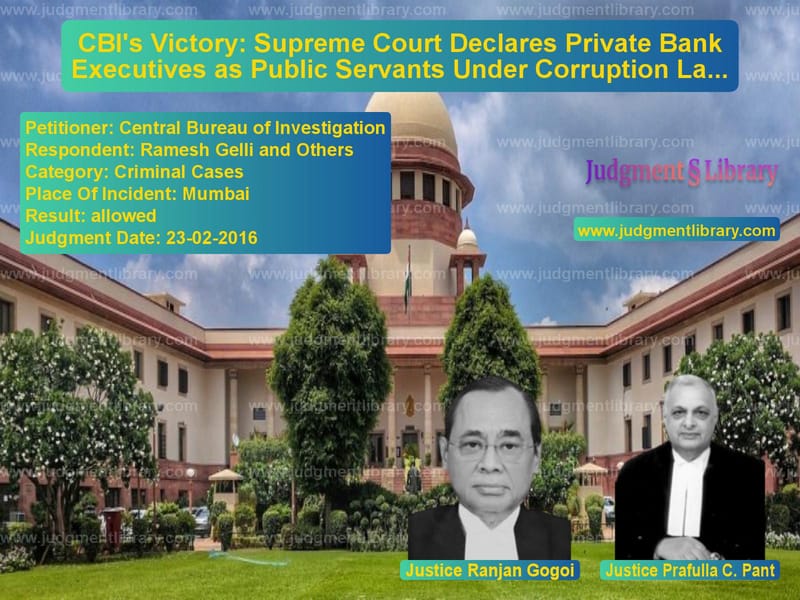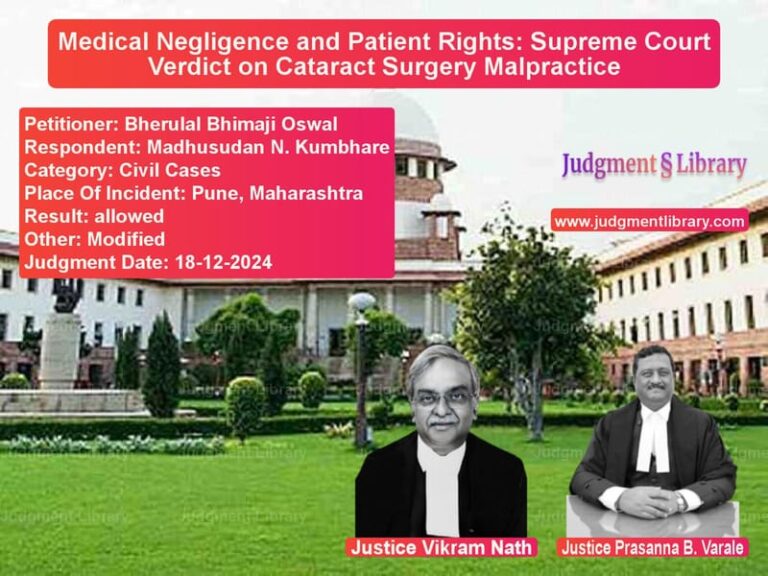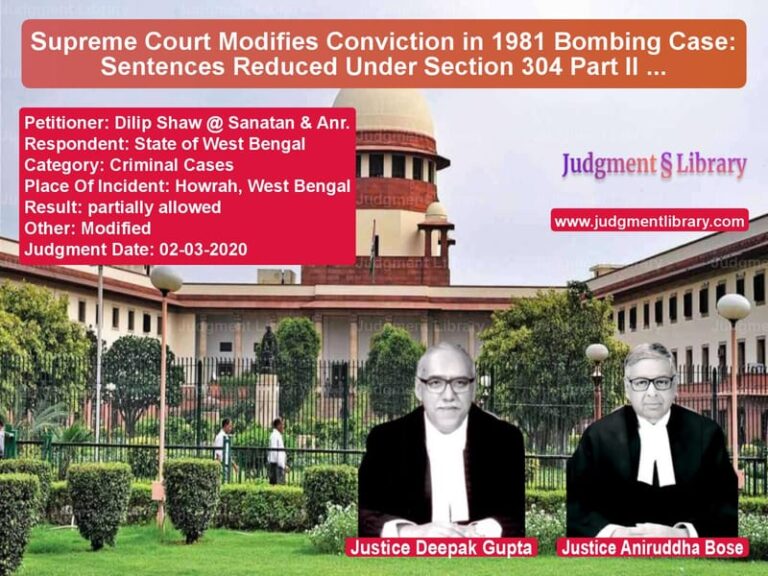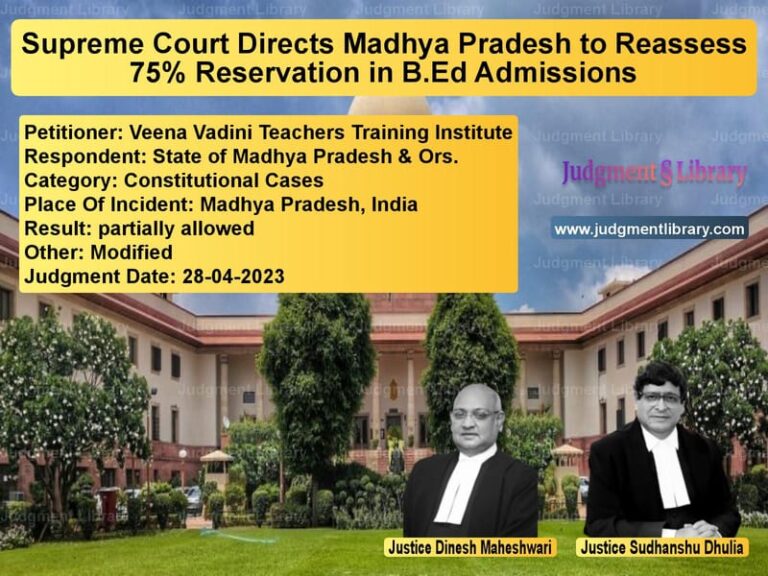CBI’s Victory: Supreme Court Declares Private Bank Executives as Public Servants Under Corruption Law
The Supreme Court of India delivered a significant judgment in the case of Central Bureau of Investigation (CBI) vs. Ramesh Gelli & Others, ruling that private bank executives can be treated as public servants under the Prevention of Corruption Act, 1988. This ruling, which overturned earlier judgments by lower courts, now allows criminal prosecution of former officials of the Global Trust Bank (GTB) under anti-corruption laws. The verdict marks a pivotal moment in corporate accountability and banking regulations.
The case revolved around fraudulent financial transactions allegedly carried out by Ramesh Gelli (Chairman and Managing Director of GTB) and Sridhar Subasri (Executive Director of GTB). They were accused of abusing their positions by sanctioning irregular loans and diverting funds, causing significant financial losses. The Supreme Court’s decision establishes a precedent that private bank executives performing public duties can be held accountable under corruption laws.
Background of the Case
The case dates back to the early 2000s, when Global Trust Bank, a private sector bank, was accused of sanctioning fraudulent loans and misusing funds. The CBI launched an investigation following the bank’s eventual collapse and merger with the public sector Oriental Bank of Commerce (OBC) in 2004. The investigation uncovered widespread financial irregularities and unethical lending practices, leading to multiple charges against the bank’s top officials.
The CBI filed cases against the accused under the following sections:
- Sections 420, 467, 468, and 471 of the Indian Penal Code (IPC) – relating to cheating, forgery, and criminal breach of trust.
- Section 13(2) read with Section 13(1)(d) of the Prevention of Corruption Act, 1988 – relating to criminal misconduct by public servants.
- Section 120B of the IPC – relating to criminal conspiracy.
Initially, the lower courts ruled that the accused could not be prosecuted under the Prevention of Corruption Act as they were not public servants. The Bombay High Court upheld this view, leading to the CBI’s appeal in the Supreme Court.
Petitioner’s (CBI) Arguments
The CBI made the following arguments in support of its case:
- Broad Definition of Public Servant: The Prevention of Corruption Act, 1988, defines a public servant broadly under Section 2(c)(viii) as any person performing public duty. Given that banking services impact the public at large and are regulated by the Reserve Bank of India (RBI), bank executives fall within this definition.
- Application of Section 46A of the Banking Regulation Act, 1949: This section explicitly states that chairmen, directors, auditors, liquidators, and other employees of a banking company shall be deemed public servants for offenses under Chapter IX of the IPC. The CBI argued that since the IPC provisions were incorporated into the Prevention of Corruption Act, this classification should apply.
- Private Banks and Public Duty: Though GTB was a private bank, its operations were heavily regulated by the RBI and involved handling public funds. The mismanagement of such a bank could severely impact depositors, justifying its executives being treated as public servants.
Respondent’s (Ramesh Gelli & Others) Arguments
The defense strongly opposed the CBI’s contentions, arguing that:
- Private Bankers Are Not Public Servants: Since GTB was a private entity before its amalgamation with OBC, its executives were not performing duties equivalent to government officials or public servants.
- Repeal of IPC Provisions: The respondents contended that Section 46A of the Banking Regulation Act was meant for offenses under the IPC, which were later omitted when the Prevention of Corruption Act, 1988, was enacted. Thus, they claimed it could not be extended to new anti-corruption laws.
- Commercial Nature of Banking Transactions: The accused argued that banking transactions between a private bank and its customers were purely commercial and did not involve a public duty that would warrant prosecution under corruption laws.
Supreme Court’s Judgment
The Supreme Court, led by Justices Ranjan Gogoi and Prafulla C. Pant, delivered a landmark ruling favoring the CBI. The court made several key observations:
1. Interpretation of ‘Public Servant’ Under the Prevention of Corruption Act
The court held that the Prevention of Corruption Act, 1988, was enacted to expand the definition of public servants. It aimed to combat corruption in all sectors where public interest is involved, including private banking institutions regulated by the RBI.
2. Legislative Intent Behind Section 46A of the Banking Regulation Act
The court noted that Section 46A of the Banking Regulation Act originally applied to Chapter IX of the IPC, which was later replaced by similar provisions in the Prevention of Corruption Act. It ruled that the legislative intent was to continue treating private bank executives as public servants under corruption laws.
3. Role of Private Banks in Public Interest
The judgment underscored that banking services impact millions of people, making their regulation and ethical conduct crucial. The RBI’s role in overseeing private banks meant their top executives were entrusted with responsibilities that aligned with the public interest.
4. Precedents Supporting Broad Interpretation
The Supreme Court referred to previous cases where the definition of public duty was interpreted broadly to include private entities performing functions of public importance. It highlighted the case of Govt. of Andhra Pradesh vs. P. Venku Reddy, which held that private organizations carrying out public duties could be considered under anti-corruption laws.
Final Verdict
Based on these findings, the Supreme Court ruled that:
- GTB executives qualified as public servants under the Prevention of Corruption Act.
- The CBI’s criminal appeals were allowed, reviving the corruption charges against Ramesh Gelli and Sridhar Subasri.
- The writ petition filed by Ramesh Gelli seeking to quash the charge sheet was dismissed.
Conclusion
The Supreme Court’s decision reinforces corporate accountability and establishes that private banking executives handling public funds are subject to corruption laws. This ruling has far-reaching implications for the financial sector, ensuring that private bank officials can be prosecuted under anti-corruption laws when their actions compromise public interest.
This case sets a precedent for future financial fraud investigations, sending a strong message that regulatory loopholes will not protect bank executives from legal scrutiny.
Don’t miss out on the full details! Download the complete judgment in PDF format below and gain valuable insights instantly!
Download Judgment: Central Bureau of In vs Ramesh Gelli and Oth Supreme Court of India Judgment Dated 23-02-2016-1741852741489.pdf
Direct Downlaod Judgment: Direct downlaod this Judgment
See all petitions in Fraud and Forgery
See all petitions in Money Laundering Cases
See all petitions in Bail and Anticipatory Bail
See all petitions in Judgment by Ranjan Gogoi
See all petitions in Judgment by Prafulla C. Pant
See all petitions in allowed
See all petitions in supreme court of India judgments February 2016
See all petitions in 2016 judgments
See all posts in Criminal Cases Category
See all allowed petitions in Criminal Cases Category
See all Dismissed petitions in Criminal Cases Category
See all partially allowed petitions in Criminal Cases Category







